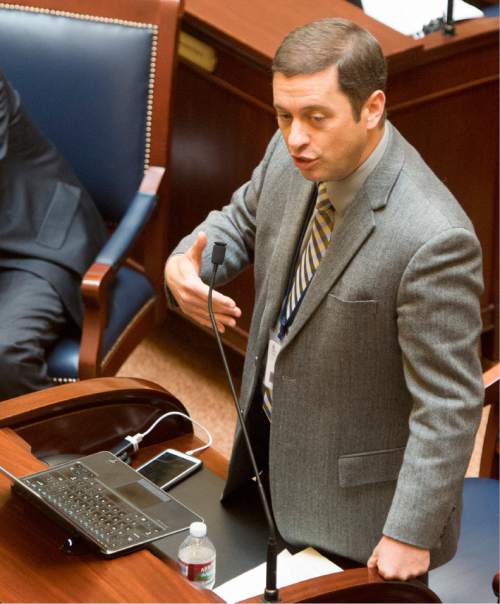This is an archived article that was published on sltrib.com in 2015, and information in the article may be outdated. It is provided only for personal research purposes and may not be reprinted.
Lehi • Utah's technical college is searching for a new leader after its top pick spurned the job last week.
The Utah College of Applied Technology will begin putting fresh calls out to its three runners-up and possibly others, its governing board decided Wednesday in a 9-3 vote.
The group also left the door open to tap a fresh candidate now that former Sen. Aaron Osmond, the chosen successor to UCAT President Rob Brems, has withdrawn from the job.
Though each of the four finalists was qualified enough to win the governor's approval, trustees say finding a replacement who is well-versed in the mechanics of government and also steeped in the technology industry will be difficult.
"There was such a gap" between Osmond and other candidates, said trustee Steven Moore. "I'm concerned there may be a problem."
It is not the only challenge. The school has no protocol for picking a new successor after an appointee passes on the job.
The murkiness is unsettling for trustee Michael Jensen. One lawmaker telephoned him recently, questioning the school's ability "to make a decision that makes any sense," he told fellow trustees via telephone from Davis County. "It makes us look silly."
The panel set a soft deadline of mid-January to choose a new president, but the trustees could postpone the date if they want more time.
In the meantime, Brems will stay at the helm through the 2016 legislative session, which closes in March. He was set to retire at the end of the year to serve a Mormon mission in Barcelona, Spain, but has put those plans on hold.
The upheaval is not the only reason UCAT has made headlines in recent months. A Nov. 11 legislative report slammed the college for "inflating" its completion rates with 60-hour job trainings and three-month programs. Brems maintains the new reporting better honors students' work and abilities.
But prior to 2013, when UCAT switched methods, his school was behind in achieving its share of the governor's goal of two-thirds of Utahns having a post-high school degree by 2020.
The lag "played a part" in the decision to broaden the counts, Brems acknowledged.
"We have had wrinkles," said Brems, "and I expect we will have continued wrinkles."
The school, created by the Legislature in 2001, is responsible for a small slice of the degree goal. Utah's eight public colleges are tasked with covering the bulk — about 90 percent.
The board approved Brems to stay at the helm through the 2016 legislative session, which closes in March.
Jensen also criticized the school's Nov. 23 announcement that Brems would stay put as president — a decision that had the approval of a handful of board members, but not the full group.
"The rest of us, I guess, are not trustworthy," Jensen said.
Brems rejected the notion. "We apologize for that," he said, adding the board needed to act fast after the announcement.
Brems said Osmond visited Brems' Lehi home after dinnertime Nov. 19 to share the news.
"Obviously," said Brems, "a lot of people here were disappointed about it, too."
Osmond accepted a surprise counteroffer from his employer Certiport, which sells career-oriented certification exams to UCAT and other schools. His move is not rooted in doubts he'd shared about the state's progress toward the ambitious education goal or in politics, he said last week, calling his decision "gut-wrenching."
The Republican also stepped down from the Legislature on Tuesday.
The new job, he said, would take too much time for him to continue representing South Jordan at the Capitol.
The other finalists were Russell Galt, vice president at the Davis campus; Darrel Hammon, Utah Valley University's senior director of academic outreach and community college programs; and the Davis campus' president, Michael Bouwhuis. It was the fifth time that current Davis campus President Michael Bouwhuis has been in the running to lead the network of schools where roughly 40,000 students are working on degrees ranging from truck driving to cooking to nursing.
In 2007, Brems resigned as UCAT president after an audit found the Orem campus had built a parade float for the Utah County Republican Party — initially on the college's dime. He also received a $157,000 transition package after his first promotion to UCAT president, the audit found, and under-reported his income on tax forms.
"Those were things that occurred several years ago," Brems said Wednesday outside the meeting. "I see us having a bright, bright future."
UCAT trustees reappointed Brems to the position in 2009 but reconsidered that choice in following weeks amid public criticism of the progress. After interviewing both finalists, the trustees again chose Brems.
Twitter: @anniebknox



